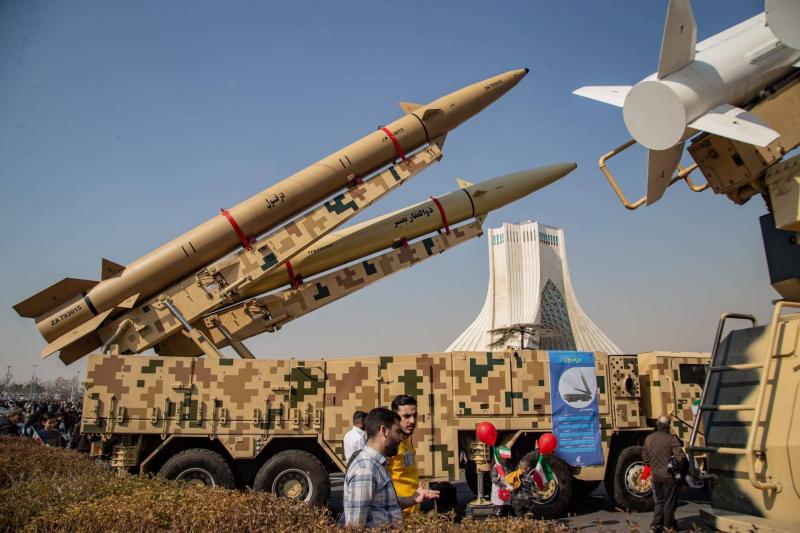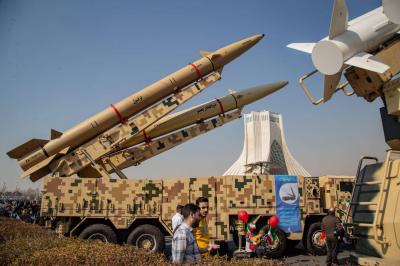Israel successfully repelled an "unprecedented" Iranian attack, thanks to its advanced air defense system and critical assistance from the United States and other Western and Arab partners. However, the "expected escalation" between the two sides could carry "serious consequences," according to a report by The Wall Street Journal. "Is it all over or not?" is a question that has sparked considerable debate following the Iranian attack on Israel, which was followed by an "Israeli promise of retaliation," while Iran deemed the matter "finished."
A forceful response on Iranian territory could lead to more devastating retaliatory operations, but failing to respond at all, or doing so weakly, could also erode deterrence, making Israel and others more vulnerable to future Iranian attacks, according to Nadav Pollak, a former Israeli governmental analyst now studying at Reichman University. He added, "Iran has entered a new phase... it has stopped hiding behind proxies and is now exposed to direct attack from Israel."
### A Small Part of a Large Arsenal
Iran is armed with the largest number of ballistic missiles in the region, according to the U.S. Office of the Director of National Intelligence. The attack on Saturday consumed only a small part of Tehran's arsenal, according to The Wall Street Journal. Iran launched a massive wave of 200 drones and missiles towards Israel, the "vast majority" of which were intercepted.
### What Are Iran’s “Missile” Capabilities?
The semi-official Iranian Student News Agency published a chart of nine Iranian missiles that it claims can reach Israel. Among these missiles is "Sijil," which can travel over 17,000 kilometers per hour with a range of 2,500 kilometers, and "Khaybar," which has a range of 2,000 kilometers, as well as "Haj Qasem," named after the commander of the Quds Force, Qasem Soleimani, who was killed in a U.S. drone strike in Baghdad four years ago.
In June, the Islamic Republic News Agency (IRNA) reported that Iran unveiled what officials described as its first domestically produced hypersonic ballistic missile. Hypersonic missiles can travel at speeds of at least five times the speed of sound and follow complex trajectories, making interception difficult. In August, Iran, a major drone manufacturer, announced it had developed an advanced indigenous drone named Mohajer-10 with a range of 2,000 kilometers, capable of flying for up to 24 hours and carrying up to 300 kilograms.
Despite only a few Iranian missiles entering Israeli territory on Saturday, the Iranian military gleaned valuable intelligence from monitoring how Israeli and American air defenses operated, according to The Wall Street Journal. Jonathan Schanzer, a researcher at the Foundation for Defense of Democracies in Washington, stated, "Iran was testing the missile defense system, the resolve of regional countries, and the determination of the United States."
### What About the Israeli Response?
Israel possesses one of the largest armies in the world, especially in terms of military capabilities, relying on "the size of its military power" to maintain its influence in the region, benefiting from U.S. support "both materially and militarily." According to Global Firepower, Israel ranks 14th among the world's strongest armies, while Iran ranks 17th.
When considering its response, Israel must also "weigh the interests of its Arab partners," such as Jordan, Saudi Arabia, and the UAE, according to The Wall Street Journal. Despite public anger over the death of tens of thousands of Palestinians during the war in Gaza, Jordan and other partners assisted Israel in countering Iranian missiles and drones on Saturday. Stephen Cook, a Middle East affairs analyst at the Washington Institute for Near East Policy, noted, "Our regional partners have intensified their efforts despite the very significant tensions between them and Israel over the past six months, and between them and the United States."
Regardless of how much regional countries dislike Israeli Prime Minister Benjamin Netanyahu, they "hate the Iranian government more," according to Cook. These Arab partners, alongside the United States and others, are likely to play a vital role in "providing intelligence and opening their airspace, and in the case of Jordan, intercepting Iranian weapons."
American officials told The Wall Street Journal that half of the ballistic missiles launched by Iran either failed to launch or fell from the sky before reaching their targets. Iran's failure to inflict damage on Israel due to Israel's superior air defenses "reveals the extent of Tehran's vulnerability regarding conventional military threats." This is why "Iran invests heavily in terrorist groups and armed forces." Bryan Katulis, a senior fellow at the Middle East Institute, stated that these various groups have "significant capabilities to inflict fear and cause considerable risks to the region."
### The Nuclear Option?
Ali Vaez, director of the Iran Project at the International Crisis Group, warned that Iran's apparent weakness in conventional military capability may carry escalation risks. As the proxy attacks by Hezbollah or Hamas or direct bombardments on Israel fail, decision-makers in Tehran might increasingly lean towards the "nuclear option," Vaez noted. If "ballistic missiles and drones" are insufficient, Iran is likely to conclude that "the only remaining outlet for them is the ultimate deterrent."




